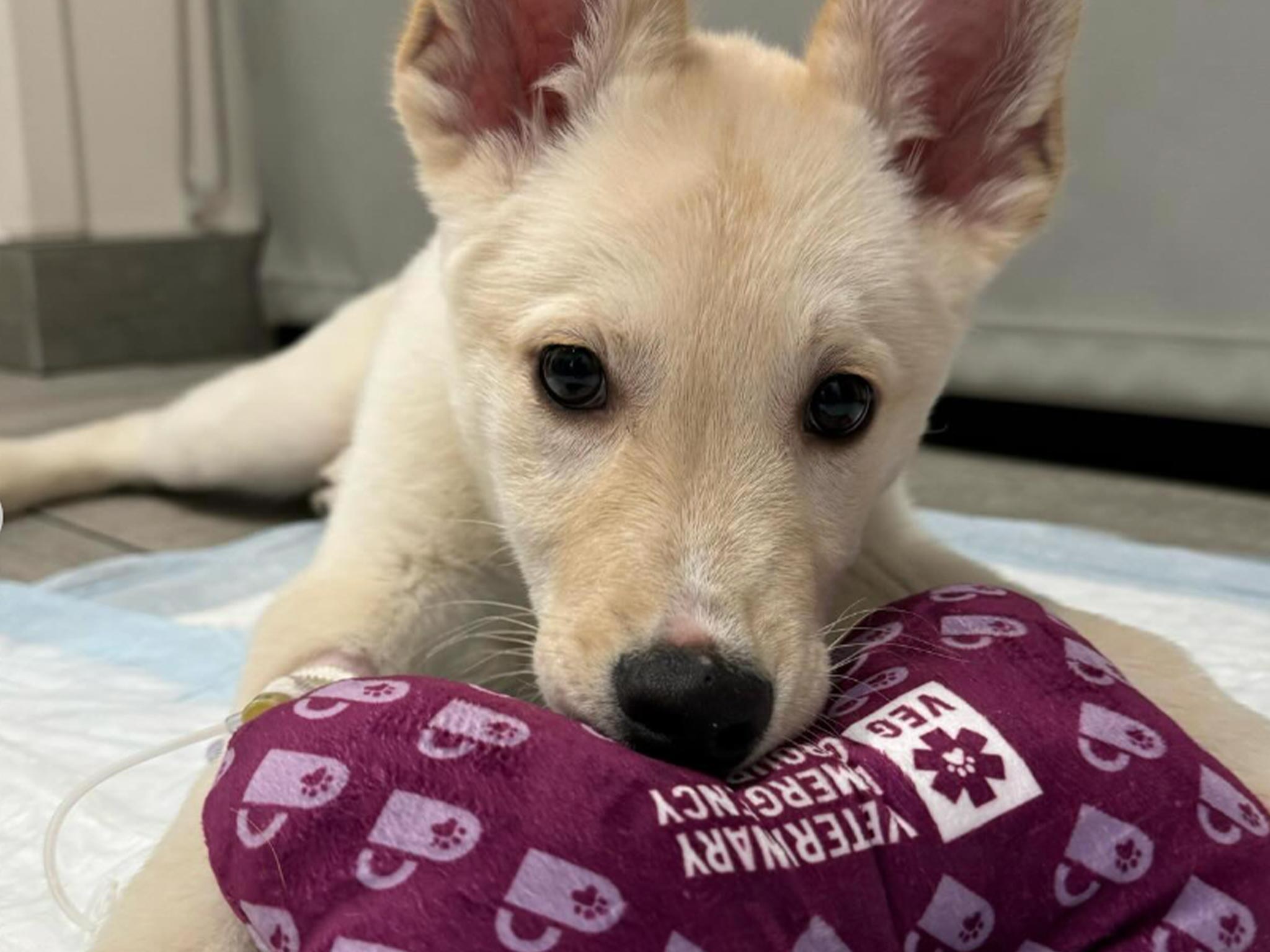
Case Study: The Dog Who Ate Ibuprofen
Dr. Casey Morrissey
Call & Speak with a doctor Open 24/7, Even Holidays!
Walk in today for:
Emergencies
Point-of-Care Ultrasound
Urgent Care
X-Rays
Diagnostics + Testing
End-of-Life Care
Surgery
Treatment + Hospitalization
Ibuprofen can be effective in treating pain for people but it’s toxic for canines and other pets. In fact, if you notice that your dog has eaten ibuprofen, you’ve got to act quickly. When it comes to dogs eating Advil or any other ibuprofen, it’s never a “let’s wait this out and see how it goes” scenario. Your dog’s life depends on how quickly you can seek professional vet help.
This veterinarian case study focuses on Riku, a 23-week-old Siberian Husky, who got into his owner’s ibuprofen. We’ll tell you about this special dog’s ER journey and how VEG’s philanthropy, VEG Cares, played a part in getting Riku life-saving care.
Riku was brought in by his owner, who estimated that his dog ate 10-20 ibuprofen tablets about one hour before arriving at VEG Edgewater’s vet emergency room. That’s 2,000-4,000mg of ibuprofen in a dog that weighs just under 15lbs. Even one 200mg of ibuprofen can be toxic to small dogs! The owner called a pet poison hotline for advice, while on the way to VEG (Veterinary Emergency Group) in Edgewater, CO. Calling a poison control hotline for pets is highly recommended as you’ll see below.
WHAT HAPPENS IF A DOG EATS IBUPROFEN?
With ibuprofen ingestion in canines, symptoms can be deadly. When a dog eats ibuprofen, it can result in:
- Gastric ulceration
- Kidney injury
- Liver damage
- Neurological problems, like tremors, ataxia (incoordination), and seizures
Yet the protagonist pup in our story was happily wagging his tail. Says VEG ER Doctor, Casey Morrissey, Riku “looked like a normal puppy who did no wrong!”
WHAT DOES AN EMERGENCY VET DO FOR IBUPROFEN INGESTION?
At VEG, customers see an ER veterinarian right away, and Riku was immediately triaged by Dr. Samantha Hart upon arrival. Blood work was drawn so the ER staff would have a baseline to work with. His physical exam was unremarkable, but that didn’t mean he was out of the woods. It was possible that the ibuprofen was not fully in the Husky’s bloodstream yet. Riku’s daytime emergency vet Dr. Morrissey explains,“Any changes to his blood work, whether positive or negative, will typically occur within 72 hours post ingestion, with the first 48 hours being the most important.”
As Riku was being examined, our team’s VEGgie care was in full force. One VEGgie called same pet poison hotline the owner had called earlier. Having the case number available made for a seamless collaboration with the hotline’s toxicologist. VEG has protocols in place for toxic ingestions but having more insight from the toxicologist only helps in the dog’s care. VEG and the toxicologist agreed on decontamination, which includes:
- Activated charcoal – this prevents absorption of toxins and is often the first line of defense for poison ingestion
- Cholestyramine – a bile acid sequestrant to bind bile to be excreted in an insoluble form and stop reabsorption into Riku’s system
- Apomorphine – this induces vomiting
The contents of the poor dog’s stomach expelled a red colored liquid, as most of the ibuprofen pills had already dissolved. Riku now required IV fluids to protect his kidneys. It also meant hospitalization so the team could monitor him, draw blood every 24 hours, and check his kidney values for up to 72 hours. This is considered the gold standard in veterinary medicine. VEG also administered a gastro protectant to protect the puppy’s GI tract.
The expert vet team monitored Riku and there were dangers to watch for:
- Neurological signs, like muscle tremors or wobbliness. If that happened, Riku would receive a muscle relaxant.
- If Riku presented with a seizure, anti epileptics would be given.
- If he took a turn for the worse, he could experience neurological concerns, such as a prolonged seizure.
- If cerebral edema, a swelling of the brain occurred, Riku’s prognosis would be grave.
To say that Riku was a lucky pup is an understatement—he didn’t present with any of these problems! Dr. Morrissey credits the expert veterinary team but also the owner by bringing Riku in for help in less than an hour from ingestion.
THE PUPPY’S BLOOD WORK AFTER IBUPROFEN INGESTION
At VEG, we’re completely transparent with owners about their pet’s care. Our veterinarian discussed Riku’s case with his owners and explained the need for hospitalization. As happens with any VEG hospital, Riku’s owner would be able to stay with him day and night while he was hospitalized. If Riku was asymptomatic at the 48-hour mark, he would be released. But he would need to come in at 72 hours to recheck blood work.
We talked to the owners about another option: going to a specialty vet hospital for a Therapeutic Plasma Exchange (TPE). This would decrease the possibility of acute kidney injury (AKI), but can be extremely expensive.
This leads to one more hurdle to get past: the owner had financial constraints and paying for hospitalization wasn’t feasible. Credit services like CareCredit or Scratchpay were not options either. But our VEG doctor had to find a way to say yes to Riku and his caring owner. VEG Cares could save the day for Riku. Woof!
VEG CARES HELPS PET OWNERS IN TIMES OF DIRE NEED
VEG Cares is VEG’s philanthropy in partnership with the Veterinary Care Foundation, a 501(c) charitable foundation. Funds raised through donations goes toward vet care for pets in need. Dr. Hart spoke to VEG’s Medical Director Dr. Evan Lehman, and they agreed that since the dog’s prognosis was otherwise good, Riku was a good candidate for VEG Cares funds. It wouldn’t cover a full 72 hours, but it could cover some of the cost.
Dr. Morrissey explains that Riku met the VEG Cares criteria that a pet be in good health other than the emergency they’re facing, and should have a good prognosis. Says Dr. Morrissey, “He was otherwise stable and VEG Cares was his best chance at not developing adverse health risks.”
Clinically, the tail-wagging Husky was doing great. They had a baseline for his alanine aminotransferase (ALT) liver enzyme and blood urea nitrogen (BUN) so they could monitor Riku’s liver and kidneys. Despite being on fluid therapy, when the liver kidney value was rechecked, his creatinine went up from .7 to 1.2. Hospitalization was now needed for a full 72 hours. The team kept charges as minimal as possible.
Initially, Riku’s owner was uncomfortable asking for financial help, but with VEG Cares to help defray some of the costs, he was inspired to take a step further to save his dog. He set up an online fundraising campaign and it received some unexpected donations!
“The owner was surprised when our VEGgies asked him to share the online donation link so they could forward it to friends and family,” recalls Dr. Morrissey, “They all shared on their socials and the funding started coming in! Having this support was amazing, and what was really exciting was seeing people from my college, who I hadn’t spoken to in years, donating.”
During his hospitalization, Riku got lots of attention, care, and cuddles from our VEGgies. During the course of 72 hours, his creatinine went from .7 to 1.2 to 1.4, which was in the wrong direction, but not overly alarming. His BUN slightly increased from 14, 16, to 19. However, he wholeheartedly enjoyed an entire room to run around in! The VEG staff gave him treats, while he hung out in his own “personal suite” in the ER that happened to be available. A VEGgie gave him a comfy blanket for when he needed to rest and recharge his batteries.
Prior to release at 72 hours, his creatinine level dropped to 1.2 and BUN to 11. He was cleared to go home, with a followup within 24 hours to recheck his levels. The next day, Riku’s creatinine was at .8 and BUN 24. Good dog!
CALL VEG FOR VET EMERGENCIES AND URGENT CARE
Swallowing the ibuprofen could have drastically affected this dog’s future health. But the star of this story pulled through and had no long term effects. Because VEG’s emergency vet team is on staff 24 hours, Riku was able to be monitored throughout the night. Because of VEG Cares, he was able to get the hospitalization and constant monitoring that he needed.
If your dog eats ibuprofen or experiences any emergency, bring them to a VEG emergency veterinarian facility immediately. Save us to your contacts to save precious time in case of emergency. Follow VEG on social and sign up for our emails for helpful emergency tips. Remember, we’re here to help all kinds of pets, like Riku, with life-saving veterinary skills.

